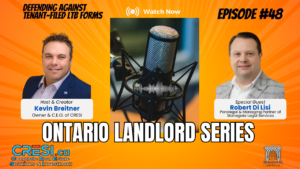As housing demands skyrocket across Ontario, legal basement apartments have become the go-to solution for savvy homeowners looking to generate substantial additional income. Creating these valuable secondary units requires navigating a complex web of regulations that vary by municipality, but the payoff is worth it. Based on expert insights from contractor Mark Noonan featured on the CRESI Ontario Landlord Series, we’ve compiled this definitive list of requirements for building fully compliant legal basement apartments in Ontario, Canada.
Did you know? Legal basement apartments in Ontario can increase your property value by 20-25% while generating $12,000-$18,000 in annual rental income!
Municipal Permit Requirements
Before starting any basement apartment renovation in Ontario, you must:
- Obtain certified architectural drawings specific to basement apartment specifications
- Submit drawings to your local municipality for approval (expect a review period)
- Receive approved permits before beginning any construction
- Build exactly to approved specifications to pass subsequent inspections
- Register the unit as a tenanted space with your municipality
- Verify zoning regulations permit basement apartments in your area
- Confirm your property is not in a floodplain zone (basement apartments are prohibited in these areas)
- Ensure your home is at least 5 years old (many municipalities have this requirement)
“Projects like these are serious. We’re taking our most prized asset and turning it into an income property. It’s critical that we have a good relationship with the city and build to proper standards.” – Mark Noonan
Structural Requirements
Every legal basement apartment in Ontario must meet these structural specifications:
- Ceiling height: Minimum 6’10¾” clearance over 75% of the area
- Minimum clearance: No area can have less than 6’4¾” of clearance (including under bulkheads)
- Size limitation: The basement unit must be smaller than the main dwelling unit
- Separate entrance: Must have its own dedicated entrance/exit to the exterior
- Entrance location: If creating a new entrance, it must be at the rear of the house
- Property line setback: Entrance must be set back at least 1.2 meters from any property line
Fire Safety Regulations
Ontario’s fire safety requirements for basement apartments include:
- Fire-rated drywall between units (walls and ceilings)
- Fire-rated doors with minimum 20-minute burn time
- Interconnected smoke alarms hardwired and daisy-chained throughout the entire property
- Carbon monoxide detectors installed in every bedroom
- Egress windows in all bedrooms (opening to minimum 3.77 feet unobstructed)
- Window size in bedrooms: Must be at least 5% of the bedroom’s floor area
- Common area windows: Minimum 2.5% of the common area’s floor space
- Fire inspection: Recommended to have documentation of compliance
Plumbing Requirements
All legal basement apartments in Ontario require:
- Full bathroom including toilet, sink, and shower/tub
- Kitchen sink with proper drainage and venting
- Backflow prevention system on main drains to prevent sewer backups
- Access to laundry facilities (either dedicated or shared with main unit)
- Proper venting for all plumbing fixtures
HVAC and Utilities
Ontario regulations mandate:
- Minimum temperature: Basement unit must maintain at least 22°C (72°F)
- Proper insulation: Between units and exterior walls for temperature regulation and sound control
- Heating system: Either shared or separate, but must maintain minimum temperature
- Electrical inspection: Required by ESA (Electrical Safety Authority)
- Sufficient electrical service: To support independent living
Additional Requirements
Other important regulations include:
- Dedicated parking: At least one assigned parking space for the tenant
- Proof of legality: Documentation to provide to tenants
- Windows for natural light: Sufficient for livability
- Sound insulation: Between units to ensure reasonable noise control
Cost Considerations
Creating a legal basement apartment in Ontario typically involves these significant expenses:
- Exterior entrance: $15,000-$20,000 if digging is required
- Backflow prevention: $1,000-$4,000 depending on existing plumbing
- Architectural drawings: $1,500-$3,000 for certified plans
- Permit fees: Vary by municipality ($1,000-$2,500)
- Fire-rated materials: Higher cost than standard construction materials
- Electrical upgrades: Often necessary to meet code requirements
Common Mistakes to Avoid
Based on contractor experience, these are frequent compliance issues:
- Inadequate ceiling height (most common reason for rejection)
- Improper egress window size or accessibility
- Insufficient fire separation between units
- Lack of proper permits and inspections
- Incorrect plumbing venting or drainage
- Missing backflow prevention
- No independent entrance/exit
Benefits of Legal Compliance
While creating a fully legal basement apartment requires significant investment, the benefits include:
- Higher property value when selling (legal units command premium prices)
- Insurance coverage (illegal units may void your insurance)
- Legal protection against tenant disputes
- Higher rental income potential from quality tenants
- Peace of mind knowing your investment is protected
- Eligibility for grants and incentives from various levels of government
Why Legal Basement Apartments in Ontario Are Worth the Investment
The demand for affordable rental housing across Ontario continues to outpace supply, creating perfect conditions for property owners to capitalize on legal basement apartments. While illegal units might seem tempting to save on upfront costs, they expose you to significant liability and can result in:
- Fines up to $100,000 in some Ontario municipalities
- Insurance claims being denied in case of damage or injury
- Forced closure and lost rental income
- Difficulty selling your property at full market value
Legal basement apartments in Ontario, by contrast, provide long-term security, increased property valuation, and peace of mind that comes from knowing your investment is fully protected.
Conclusion
Creating a legal basement apartment in Ontario requires careful planning and strict adherence to building codes and municipal regulations. Working with qualified professionals—including contractors who specialize in basement apartments, certified architects, and licensed tradespeople—is essential for navigating these complex requirements.
The initial investment in compliance pays dividends through higher rental rates, better tenants, and significantly increased property values. In today’s competitive Ontario housing market, legal basement apartments represent one of the smartest investments a property owner can make.
Related: Stress-free tools for landlords



